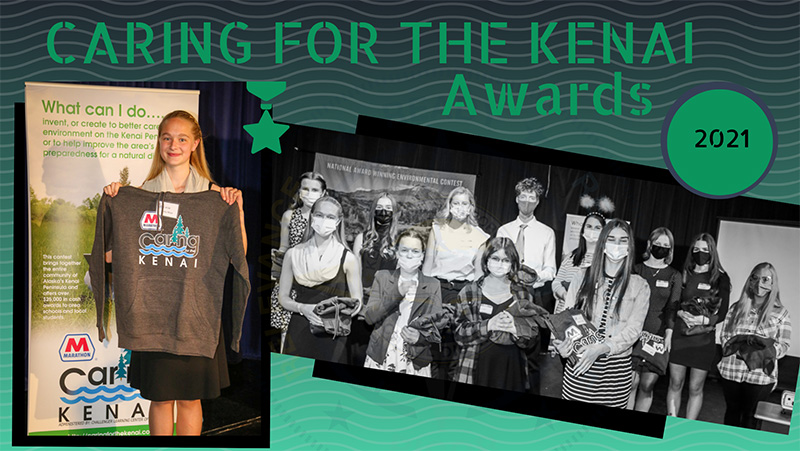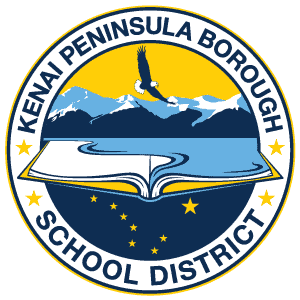Caring for the Kenai is 31, with 12 innovative projects!

Wednesday night, the tale of the birds and the bees took a unique twist when Emily Moss addressed a potential environmental issue of too many bald eagles at the Soldotna landfill with her original “Bee Bomb” project. “I didn’t think I’d end up taking first place. There was really a lot of competition here tonight with some really great ideas addressing very important issues in making our community and environment a better place,” said Emily. “I got my idea by skiing and running the Tsalteshi Trails and noticing a lot of litter and eagles around the landfill. When birds eat at the landfill, they are actually spreading anti-microbial resistant bacteria. I learned there are pathogens that have mutated and become resistant to antibiotics which are harmful to humans and our environment. In researching my project to address this issue I found that bees are a deterrent to birds, so this summer I plan on setting up beehives or ‘Bee Bombs” at the landfill to further study my project.” For taking first place, Moss will receive a check for $1,600 at the joint Chamber of Commerce meeting next week.
The CFK essay prompt challenges high school students to respond to the question “What can I do, invent or create to better care for the environment of the Kenai Peninsula or improve the area’s preparedness for a natural disaster?” The contest is approved to use in high school curriculum for the Kenai Peninsula School District and sponsored by Marathon Petroleum and five community partners.
Taking second place and earning $1,100 was Maggie Grenier from Nikiski Middle-High School for her creation of “Carol the Composting Cow.” “Coming into the competition I just wanted to be here and experience being a finalist and meet the other competitors. This is such a great competition because everyone is so kind and it’s not like trying to beat someone else—we were all supporting each other and wanting everyone to succeed,” said Maggie. Carol the Composting Cow is a character (Maggie’s mom in a cow suit) with a message to appeal to all ages about the benefits of composting and how to do it, “My mom is my right hand and she was there to help me with anything I asked her to do, so when I said I wanted her on stage with me as Carol the Composting Cow she got a costume and was with me all the way.”
In third place and claiming a $900 prize was Nekoda Cooper of Kenai Central High School. It was Nekoda’s second time to be selected as a CFK Finalist. The granddaughter of a homesteader, Nakoda has continued her marketing of imperfect produce creating a local market for fruits and vegetables that otherwise would be wasted. She plans to author an imperfect produce recipe book that will be available this summer at the Wednesday Market in Soldotna.
Taking fourth place honors and $750 was Regan Evans, a home school student with KPBSD Connections Homeschool. Regan was the first student to ever have two different entries make it into the top 12. Her fourth place idea was a “True Blue Solution” that turns recycled denim into insulation that she will be installing into Conestoga Micro-Shelters for people who are homeless. Evan’s other entry achieved runner-up status, and is a program calledG.R.A.D. Trees (Growing Roots & Dreams) which is a reforestation program for sixth grade students graduating into Middle School.
Coming in fifth and winning the $650 prize was the team of Abigail Youngberg and Lauren Lamb of Cook Inlet Academy (CIA) which created a Smart Stocker App to keep people prepared for a natural emergency even if all technology fails.
Also, from CIA and taking the sixth place prize of $550 was Tatum Rozak with her idea of “Know to Grow” a composting project to reduce waste and make free nutritious soil.
In addition to the $8,000 in cash awards for the finalists, this year $20,000 will be awarded to the school science departments. Thanks to the CFK signature sponsor Marathon Petroleum Corporation and the community partners of the Kenai River Raven Lodge, Peninsula Community Health Services, Sweeney’s Clothing, Eyewear Express, and KSRM radio group.
High schools using CFK as part of state standards curriculum were: Cook Inlet Academy, Homer High School, Nikiski Middle-High School, and KPBSD Connections Homeschool. Students can enter every year of their high school career, whether the contest is assigned in class or not.
Each school receives $750 for their participation and the remainder of the $20,000 is allocated according to how the school’s students ranked in the CFK competition. Other finalists that earned $400 each for making it to the final 12 out all the entries submitted were:
- Giaseena Nicks, Nikiski Middle-High School, “Invasive Plant Cards”
- Olivia Etzwiler, Homer High School, “Hazards You May Be Creating”
- Hannnah Stonorov, Homer High, “Access to Oil Absorbents”
- Jessica Perry, Nikiski Middle-High School, “B.E.E. Bold” (Bringing Environmental Education to Youth)
- Seamus McDonough, Homer High School, Moose Kill mapping
“CFK is an opportunity for Peninsula students to have a real-world experience. The creativity and resiliency of our community and our youth during these trying brings hope for the future,” said Merrill Sikorski CFK creator. On Wednesday, April 28, the finalists and participating teachers will receive their awards at a joint chamber open to the public during the Soldotna/Kenai Chamber of Commerce meeting at the Soldotna Sports Center.
This year’s panel of judges included KPB Assembly president Brent Hibbert; Cameron Hunt (Marathon Petroleum Corporation); Clayton Holland, incoming KPBSD Superintendent; Dick Erkeneff (Kenai River Raven Lodge); Branden Bornemann (Director Kenai Watershed Forum); and Anna DeVolld (2020 CFK 1st Place Winner).
- Watch the Final 12 Oral Presentation video
- Caring for the Kenai website
- Caring for the Kenai on Facebook
